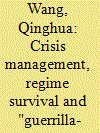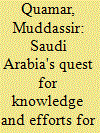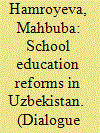| Srl | Item |
| 1 |
ID:
130445


|
|
|
|
|
| Publication |
2014.
|
| Summary/Abstract |
Based on newly available memoirs and previously unexplored policy speeches by insiders, this article conducts a political analysis of the Chinese Communist Party's decision to radically expand college enrollment in June 1999. I argue that the decision exemplifies a "guerrilla-style approach" to policy-making. From late March to early June of 1999 when the radical expansion policy was formulated and legitimated, the top leadership ignored opposition from the Ministry of Education (MOE), overturned established policies and assumed de facto control over MOE bureaucratic power. This abrupt, forceful, disruptive and non-professional policy intervention, which aimed to ensure regime survival in the wake of the Asian financial crisis, was antithetical to regularized educational policy-making in post-Mao China.
|
|
|
|
|
|
|
|
|
|
|
|
|
|
|
|
| 2 |
ID:
143155


|
|
|
| 3 |
ID:
129423


|
|
|
|
|
| Publication |
2014.
|
| Summary/Abstract |
After gaining independence, Uzbekistan created favourable conditions for development of education. Legal framework for working out a national education policy was the imperative of the day. Only on the
basis of a strong cadre policy could the country look forward to development and choose its own path. Adoption of the Constitution of the Republic of Uzbekistan was the first step in this direction that guaranteed all citizens the right to education. It provided that the State shall guarantee free secondary education to all children. Schooling is under the State control.1 Subsequent reforms were undertaken in a
phased manner and these reforms have helped in improving the structure and content of education. This paper deals exclusively with the school education at a time when the country transited from decadent Soviet system to a new system of school education.
|
|
|
|
|
|
|
|
|
|
|
|
|
|
|
|
| 4 |
ID:
133812


|
|
|
|
|
| Publication |
2014.
|
| Summary/Abstract |
To win the hearts and minds of the Chinese people, Chinese Communist leaders launched a series of educational reforms to instill new socialist ideas and nationalistic fervor in kindergarteners immediately after the founding of the People's Republic of China in 1949. Under the strong influence of Soviet advisers and through a number of methods (games, singing, storytelling, site visits), Chinese kindergarteners were taught the nobility of labor, the sacrifice of soldiers, the grandeur of Tiananmen Square, the wise leadership of Chairman Mao Zedong, and the evilness of enemies. However, contrary to the conventional view, this article argues that Chinese education officials and kindergarten teachers never blindly followed Soviet educational models. They appropriated Moscow's techniques to suit their domestic needs, which included promoting nationalist feelings among children to consolidate the Chinese Communist Party's legitimacy and power. Ultimately, Chinese kindergarteners were turned into Party loyalists, not admirers of a foreign socialist model. Although the Party encountered difficulties in recruiting reliable teachers to implement its policies, it was able to impose nearly total control from above over the political content of kindergarten education. Under the one-party system, Chinese children were only taught what the Communist leaders wanted them to learn.
|
|
|
|
|
|
|
|
|
|
|
|
|
|
|
|